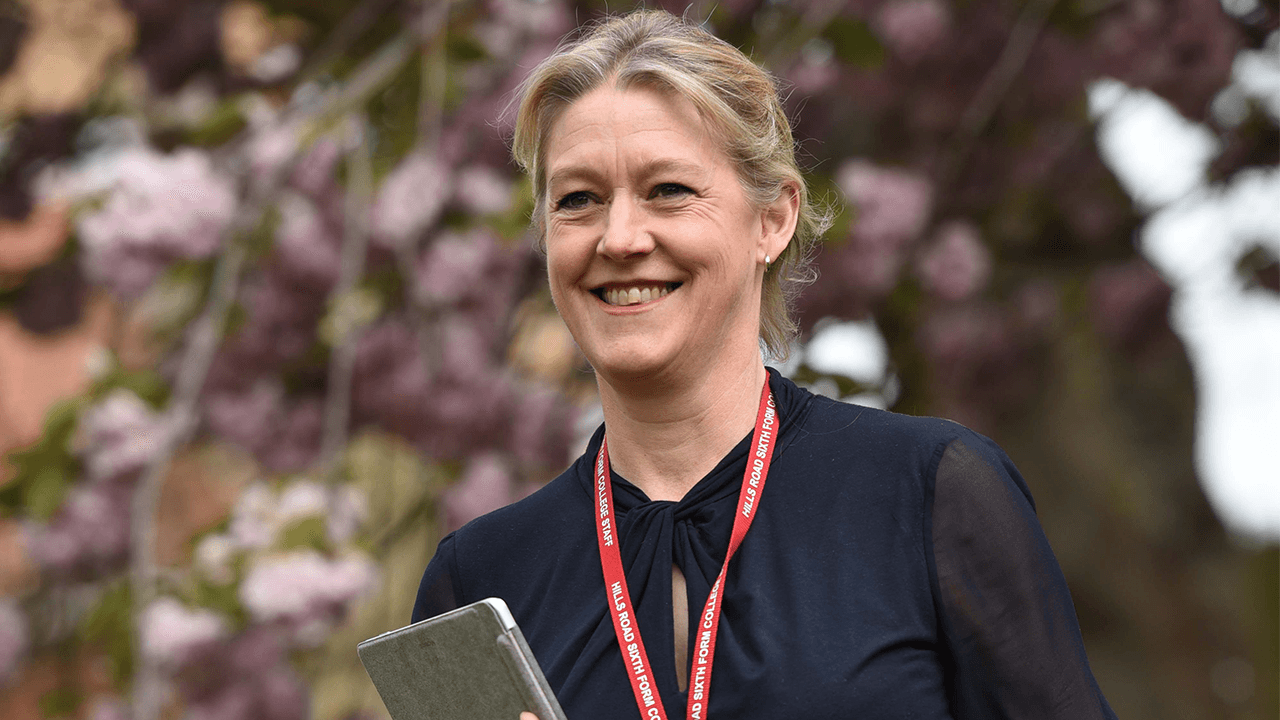Principal Jo Trump sits down with Cambridge 105
Principal Jo Trump recently sat down for an interview with Nick Barraclough, of Cambridge 105, to discuss her own education, time out in Africa, what brought her to the wonderful city of Cambridge, and her work at Hills Road.
Published on 07/06/2024

Jo talks to Cambridge 105
Principal Jo Trump recently sat down for an interview with Nick Barraclough, of Cambridge 105, to discuss her own education, time out in Africa, what brought her to the wonderful city of Cambridge, and her work at Hills Road.
Jo talked about a wide range of important issues related to life at a sixth form, including the transition between school and college, the importance of the arts being taught, and went on to dispel some of the myths surrounding the college.
She would also pick a selection of songs for the radio show’s dessert island segment, from Les Misérables's ‘Stars’ to Eurythmics’ “Sisters Are Doin' It for Themselves”, and how these numbers have impacted her throughout her life.
Below are some key highlights and takeaways from this interview. For the full experience, head to Cambridge 105 to learn more about Jo Trump and Hills Road.
Transitioning between school and college
Nick brought up the importance of helping students make the jump between learning within a school and college environment.
He commented, that: “I know from personal experience, because both of my children came here [HRSFC], the one thing that it seems to do so effectively is that transition between school and college. Because my two, when they started here, they started to feel like students straightaway, and less like pupils, and there's a marked difference.
Jo responded by highlighting how sixth forms provide “cushioned adulthood”, in which colleges provide “all the support structures of home still, but there is that challenge of coming into a big new environment, mixing with people that you’ve not met before, and I think those students that can cope with that at 16 can really thrive at 18 in those new environments.”
Myths surrounding Hills Road
Jo went on to dispel some of the myths surrounding the college, including how it creates ‘a pressurised environment’, which she argued is ‘out-of-date perception' of the college.
“We do get the results, but we get that by great support. Those kind of achievements for young people don’t come by accident and they have to have all of that support along the way to achieve as they do. [...] I understand all the myths that are attached to it being an academic pressure cooker, but that’s really not my experience of it. It’s not what we aim for!”
Instead of simply focusing on obtaining high grades, Hills Road has established a broad curriculum where students can learn a wide array of skills to become responsible and active citizens.
Teaching the arts
Nick went on to highlight how Hills Road’s Music department was “thriving” and some of the fantastic work that students have performed in the past. Considering this, he discussed how art, drama, music, and other creative subjects are often viewed as subjects that are the “preserve of the privileged”.
In response, Jo commented: “I hope not but the danger is definitely there in terms of the need to fund music and performing arts right through the curriculum and pre-sixteen. Some of the challenges that schools are exposed to, not least the funding pressures, mean that some of these things potentially get squeezed out, and are less of an entitlement curriculum than we would want them to be.
“One of the joys of being as large as we are, is that we get to embrace a wide musical community of talent that comes from a huge range of schools, such that we’re lucky enough to put out multiple choirs and orchestras, jazz bands, folks' groups, etc. Students come together simply for the pleasure of making music.
“We work very hard here to ensure that we can continue to run those courses and support them and to make sure that performing arts, music, art, and drama can continue to thrive.”
